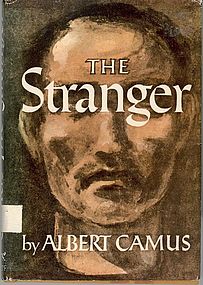 It is one of my esteemed co-blogger’s comment on one of my blogs which had drawn me inexorably towards Albert Camus and his writings. Before that, I am sorry to say, I had not even heard his name. Camus (1913-1960), a Nobel Laureate in Literature (1957), was a French writer, philosopher and propounder of absurdism. The absurdists believe that the coexistence of the Universe and the human mind are in inherent contradiction with each other making it humanly impossible, given the vast realm of information and the unknown, to find the ultimate truth. Camus’ novel The Stranger (1942) is an archetypical statement on existentialism (though Camus rejects it) and the absurd.
It is one of my esteemed co-blogger’s comment on one of my blogs which had drawn me inexorably towards Albert Camus and his writings. Before that, I am sorry to say, I had not even heard his name. Camus (1913-1960), a Nobel Laureate in Literature (1957), was a French writer, philosopher and propounder of absurdism. The absurdists believe that the coexistence of the Universe and the human mind are in inherent contradiction with each other making it humanly impossible, given the vast realm of information and the unknown, to find the ultimate truth. Camus’ novel The Stranger (1942) is an archetypical statement on existentialism (though Camus rejects it) and the absurd.
Meursault, the protagonist of the novel, attends his mother’s funeral at the Home for the Aged Persons at Marengo. His calmness and composure, during the last rites, attract the attention of the inmates. On his return, Meursault revives his friendship with Marie, who used to once work at the same office where he works. Given to taciturnity, Meursault does not clearly elucidate his feelings for Marie. However, Marie is eager to marry him. He also strikes up a closer association with his dubious neighbour Raymond Sintes. By and by Raymond confesses that he is having rough patches with his Moorish mistress. On his request, Meursault gets involved in Raymond’s plan to teach her a lesson. However, both fail to take into account the resultant unpleasantness when the plan half succeeds. Raymond gets into a brawl with the girl’s brothers (Arabs) and it is Meursault, who in a heat haze, kills one of them.
Meursault is arrested and put under trial. It is during the court proceedings that Camus systematically reveals how societal dictates impinge upon the concept of natural justice. It is not the act of crime but the preconceived notions of the justice-deliverers that colour the rulings. Meursault is identified as a hard-core criminal by his behaviour preceding and after the killing – his atheism, his lack of remorse during his mother’s funeral rites, his physical intimacy with his girlfriend the very next day of his mother’s death, his refusal to break down before the magistrate as a sign of repentance, his total lack of guilt, his matter-of-factness during the entire trial proceedings and finally his disregard for the prison chaplain – are considered to be sufficient indicators of how unfeeling and criminal minded he is. We are conditioned by the established norms of the society and quick to being judgmental against those who do not conform to set behavioural patterns.
Parallely, Camus diligently addresses the issues of individual liberty – the freedom to express  oneself the way one wants – and punishment (as mitigated by the law implementers of the land) as a mechanism designed to progressively curtail free thinking and free living of those whom society considers detrimental to civilization. Contentious and debatable Camus creates a surreal atmosphere in his novel, The Stranger, wherein the protagonist as an individual is as dispassionate and detached a player amidst the “benign indifference of the Universe” – the L’ Etranger.
oneself the way one wants – and punishment (as mitigated by the law implementers of the land) as a mechanism designed to progressively curtail free thinking and free living of those whom society considers detrimental to civilization. Contentious and debatable Camus creates a surreal atmosphere in his novel, The Stranger, wherein the protagonist as an individual is as dispassionate and detached a player amidst the “benign indifference of the Universe” – the L’ Etranger.
In stark contrast to the Karmic advocacy of a singular stream of super consciousness binding the cosmos in its entirety in one thread, Camus’ approach is relentlessly pessimistic. Time and again, the portrayal of individual existence usurps the form of an isolated journey, in the midst of frenzied monotony of day to day living, juxtaposed haplessly against an ever churning yet apathetic Universe. The revelation is almost suicidal and a betrayal of the buoyant note of optimism and hope that mankind vouches for. Underlies a Spencerian streak too hopelessly imputing utilitarian worth to a man’s aimless wandering following the currents of time’s linearity. Pitted against this ever-expanding vastness of the Universe, man is a condemned creature of circumstances – extenuating or otherwise.
Camus is disturbing and not exactly a hope raiser. An upsurge of emptiness and meaninglessness overwhelms as Meursault is sentenced to the guillotine and no clue is supplied by the author whether an appeal to the next higher authority in hierarchy may yield a verdict in his favour. While illusion is as absurd as reality, one would, for the sake of an assumed continuum of euphoria, wish to hold on to a shadow of the former than give up irrevocably to the harshness of the latter.
Camus’ narrative is in the first person and except the last few chapters (Meursault’s life in prison) not exactly descriptive or introspective. Notwithstanding, Stuart Gilbert’s translation is lucid and conveys well the universal loneliness of existence howsoever gregarious the human species is intended to be. Interestingly, the narrative focuses and floats on a string of happenings underscoring the essence of being in the awareness of one’s existence and surrounds. Even during the most dramatic or cathartic moment, there is no indulgence in nostalgic remembrance of the past or dwelling upon the lack of certitude of the future. Remarkable is the detached acceptance of the protagonist even as the last ray of hope appears to be progressively diminutive.
 Having said all that, Camus makes one think. However, even as he denies, Meursault’s fated end amidst “howls of execration” is a conformation to Society’s diktats. The Stranger has layered strata of incredulity and a realm of larger acceptance which is almost enviable in its accomplishment and at the same time implausible to attain if viewed pragmatically. Yet, it’s an unforgettable classic because in the final analysis it speaks of the timeless desire of man to live life on his own terms.
Having said all that, Camus makes one think. However, even as he denies, Meursault’s fated end amidst “howls of execration” is a conformation to Society’s diktats. The Stranger has layered strata of incredulity and a realm of larger acceptance which is almost enviable in its accomplishment and at the same time implausible to attain if viewed pragmatically. Yet, it’s an unforgettable classic because in the final analysis it speaks of the timeless desire of man to live life on his own terms.










My! Geetha, what a learned treatise this was. I couldn’t figure out half of it let alone trying to digest Camus if and when I find his book! You are way,way above my intellectual bounderies.
LikeLike
A review should be lucid and interest inducing. If you say you have not been able to figure out what I have written it is surely a mammoth failure on my part. Thanks for patiently reading it out.
LikeLike
Interesting.
I have not read his works, this is new to me.
LikeLike
I can send you the PDF version in case you wish to share you email ID.
LikeLike
Thanks for presenting the immensely useful reivew of this book. I have understood the essence of the book and would like to read it when time permits me to do so because despite being desirous to live my life on my own terms, I am not fortunate enough to do so and may be able to read this book sometime in future only.
Jitendra Mathur
LikeLike
I can send you the PDF version of the book if you so wish
LikeLike
Geeta, your ability as a book reviewer is commendable. Reading this I am tempted to add this book to my ‘To read’ list.
LikeLike
Lakshmi thank you so much for your appreciation.
LikeLike
The book raises so many questions ….philosophical would be an under-statement to describe those questions. The thing which haunts me most is that what are those qualities which make a human a true human being or rather what is the definition of humanity..
A very nice review transcending obscurity and revealing the essence of Camus’ philosophy… 🙂
LikeLike
Thanks Maniparna. I am glad that you liked it.
LikeLike
Mention not…my pleasure.. 🙂
LikeLike
This is is an outstanding review. Camus is the only author of whom I have read an entire compendium, and being new to Camus, you nailed it. L’etranger is obviously the classic, but you should check out La Chute (the fall) – even Jean-Paul Sartre acknowledges it as his finest work. No book has made me examine who I am as a person in a larger world than this one.
LikeLiked by 1 person
Thanks. I shall surely check out his other creation.
LikeLike
This seems like a must-read book. I love reading about intricacies of mine and the conflicts arising with societal norms. Will try to get my hands on a paperback as am not much of an ebook person.
LikeLiked by 1 person
Please do Amrit!
LikeLike